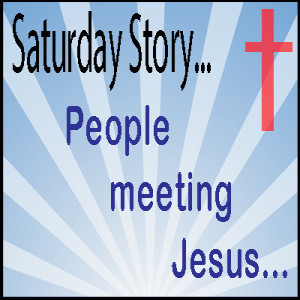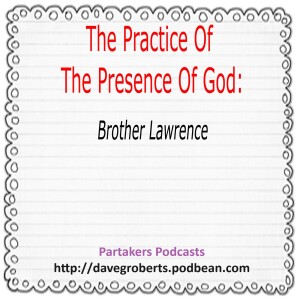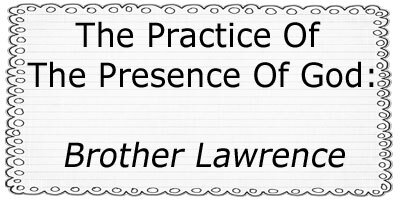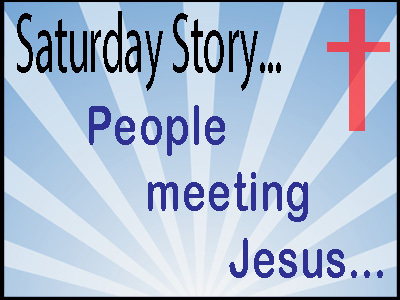
G’day and welcome to Partakers Christian Podcasts! Join us for uplifting Bible teaching, inspiring readings, heartfelt worship, powerful prayers, and fascinating church history. Whether you’re new to faith or growing deeper in your journey, we’re here to encourage and equip you. 🎧 Tune in, interact, and be inspired—wherever you are in the world.
Episodes

Sunday Aug 11, 2024
Sunday Prayer Worship 9 August 2024
Sunday Aug 11, 2024
Sunday Aug 11, 2024
Prayer For A Broken Country
by Sue Goodall
Dear Lord,
Let others see in me:
An ounce of love;
A millilitre of kindness;
A drop of hope;
The tiniest flame of
Something different.
~
Dear Lord,
Help me to be:
A reservoir of love;
A resource of kindness;
A ray of hope;
The tiniest reveal of
Something enviable.
~
Dear Lord,
Let others meeting me:
Be open to see;
Open to hear;
And open to ask
All that they need to know
To meet you themselves.
Amen
Tap or click here to save this as a mp3 file
About Sue Goodall
I was born in 1963 in Enfield and love writing, painting and singing. (Singing Grade V and clarinet grade VIII). Not to mention photography. I am a mum of one teen daughter and have two rescue cats. The three of them are very much loved and central to my life, as is my faith...
I became a Christian when I was eighteen. It's been a rollercoaster ride but without Him, well....
I LOVE the written word and find poetry can say - in my own, private opinion - so much more in such a few words. It can paint a metaphorical picture, get the reader considering and questioning and touch people's emotions.
I had prayed and asked God that is He would have me pursue writing and wanted to use the poems to speak to other people, He would show my CLEARLY and open doors. The next day, Dave Roberts asked me to record two poems.... WOW indeed! He is a great God!

Sunday Aug 04, 2024
God’s Whisperings n Roars - The Bible - Sermon
Sunday Aug 04, 2024
Sunday Aug 04, 2024

God’s Whisperings n Roars
The Bible As A Basis Of Faith
Words are our prime means of communication. We think in words, reason in words, talk in words, joke in words, write in words and speak in words. We listen to words as they are spoken. We read words written. There are about 7000 different languages in use globally, as well as untold dead languages. Humans have always communicated to each other in some way with the use of words. It is part of being God’s creation! It is also part of how we are like God, for God is a communicator! Indeed, Jesus being the Word of God, is very how the apostle John starts off his gospel. As for myself, God has whispered His roaring love for me and that I am His beloved and adopted child. The Bible tells me so. The Bible!
Bible readings are from: Leviticus 20:22-26; Psalm 119:105-112; James 1:22-27; 2 Peter 1:16-21
Listen to the audio to discover more about the Bible and how and why it is a basis for our Christian faith! This is the whole Church service including songs, Bible readings, sermon and prayers.
Originally preached at Poulner Baptist Chapel
Tap or click here to download as a mp3

Saturday Jul 13, 2024
Saturday Story - Life
Saturday Jul 13, 2024
Saturday Jul 13, 2024
Saturday Story
People meeting Jesus
6. The story of Life from the Faroe Islands...
We continue apace into the twentieth century and hear the story of a friend of mine. Her name is Life and she is from the Faroe Islands. Let's look together at how and why she started her Christian journey and the relevancy of Jesus Christ to her life! Come and listen to her story of faith...

Tuesday Jul 02, 2024
The Practice Of The Presence Of God - Brother Lawrence Part 19
Tuesday Jul 02, 2024
Tuesday Jul 02, 2024

The Practice Of The Presence Of God:
The Best Rule Of A Holy Life
GOD knows best what is needful for us, and all that He does is for our good. If we knew how much He loves us, we should be always ready to receive equally and with indifference from His hand the sweet and the bitter; all would please that came from Him. The sorest afflictions never appear intolerable, but when we see them in the wrong light. When we see them in the hand of GOD, who dispenses them: when we know that it is our loving FATHER, who abases and distresses us: our sufferings will lose their bitterness, and become even matter of consolation.
Let all our employment be to know GOD: the more one knows Him, the more one desires to know Him. And as knowledge is commonly the measure of love, the deeper and more extensive our knowledge shall be, the greater will be our love: and if our love of GOD were great we should love Him equally in pains and pleasures. Let us not amuse ourselves to seek or to love GOD for any sensible favors (however elevated) which He has or may do us. Such favors, though never so great, cannot bring us so near to GOD as faith does in one simple act. Let us seek Him often by faith: He is within us; seek Him not elsewhere. Are we not rude and deserve blame, if we leave Him alone, to busy ourselves about trifles, which do not please Him and perhaps offend Him? 'Tis to be feared these trifles will one day cost us dearly.
Let us begin to be devoted to Him in good earnest. Let us cast everything besides out of our hearts; He would possess them alone. Beg this favor of Him. If we do what we can on our parts, we shall soon see that change wrought in us which we aspire after. I cannot thank Him sufficiently for the relaxation He has vouchsafed you. I hope from His mercy the favor to see Him within a few days. Let us pray for one another.
[He took to his bed two days after and died within the week.]
Click or Tap here to listen or save this as an audio mp3 file
~ You can now purchase our books! Please do click or tap here to visit our Amazon site!

Monday Jul 01, 2024
The Practice Of The Presence Of God - Brother Lawrence Part 18
Monday Jul 01, 2024
Monday Jul 01, 2024

The Practice Of The Presence Of God:
The Best Rule Of A Holy Life
I render thanks to our LORD, for having relieved you a little, according to your desire. I have been often near expiring, though I was never so much satisfied as then. Accordingly I did not pray for any relief, but I prayed for strength to suffer with courage, humility, and love. Ah, how sweet is it to suffer with GOD! However great the sufferings may be, receive them with love. 'Tis paradise to suffer and be with Him; so that if in this life we would enjoy the peace of paradise, we must accustom ourselves to a familiar, humble, affectionate conversation with Him: we must hinder our spirits wandering from Him upon any occasion: we must make our heart a spiritual temple, wherein to adore Him incessantly: we must watch continually over ourselves, that we may not do, nor say, nor think anything that may displease Him. When our minds are thus employed about GOD, suffering will become full of unction and consolation.
I know that to arrive at this state, the beginning is very difficult; for we must act purely in faith. But though it is difficult, we know also that we can do all things with the grace of GOD, which He never refuses to them who ask it earnestly. Knock, persevere in knocking, and I answer for it that He will open to you in His due time, and grant you all at once what He has deferred during many years. Adieu. Pray to Him for me, as I pray to Him for you. I hope to see Him quickly.
Click or Tap here to listen or save this as an audio mp3 file
~ You can now purchase our books! Please do click or tap here to visit our Amazon site!

Sunday Jun 30, 2024
The Practice Of The Presence Of God - Brother Lawrence Part 17
Sunday Jun 30, 2024
Sunday Jun 30, 2024

The Practice Of The Presence Of God:
The Best Rule Of A Holy Life
To the same he exhorts for fuller and entire confidence in God, for body and soul.
I told you, in my last, that He sometimes permits bodily diseases to cure the distempers of the soul. Have courage then: make a virtue of necessity: ask of GOD, not deliverance from your pains, but strength to bear resolutely, for the love of Him, all that He should please, and as long as He shall please.
Such prayers, indeed, are a little hard to nature, but most acceptable to God, and sweet to those that love Him. Love sweetens pains; and when one loves God, one suffers for His sake with joy and courage. Do you so, I beseech you; comfort yourself with Him, who is the only Physician of all our maladies. He is the Father of the afflicted, always ready to help us. He loves us infinitely more than we imagine: love Him then, and seek not consolation elsewhere: I hope you will soon receive it. Adieu. I will help you with my prayers, poor as they are, and shall be, always, yours in our Lord.
Click or Tap here to listen or save this as an audio mp3 file
~ You can now purchase our books! Please do click or tap here to visit our Amazon site!

Saturday Jun 29, 2024
The Practice Of The Presence Of God - Brother Lawrence Part 16
Saturday Jun 29, 2024
Saturday Jun 29, 2024

The Practice Of The Presence Of God:
The Best Rule Of A Holy Life
IF we were well accustomed to the exercise of the presence of GOD, all bodily diseases would be much alleviated thereby. GOD often permits that we should suffer a little, to purify our souls, and oblige us to continue with Him. Take courage, offer Him your pains incessantly, pray to Him for strength to endure them.
Above all, get a habit of entertaining yourself often with GOD, and forget Him the least you can. Adore Him in your infirmities, offer yourself to Him from time to time; and, in the height of your sufferings, beseech Him humbly and affectionately (as a child his father) to make you conformable to His holy will. I shall endeavour to assist you with my poor prayers.
GOD has many ways of drawing us to Himself. He sometimes hides Himself from us: but faith alone, which will not fail us in time of need, ought to be our support, and the foundation of our confidence, which must be all in GOD. I know not how GOD will dispose of me: I am always happy: all the world suffer; and I, who deserve the severest discipline, feel joys so continual, and so great, that I can scarce contain them.
I would willingly ask of GOD a part of your sufferings, but that I know my weakness, which is so great, that if He left me one moment to myself, I should be the most wretched man alive. And yet I know not how He can leave me alone, because faith gives me as strong a conviction as sense can do, that He never forsakes us, till we have first forsaken Him. Let us fear to leave Him. Let us be always with Him. Let us live and die in His presence. Do you pray for me, as I for you?
Click or Tap here to listen or save this as an audio mp3 file
~ You can now purchase our books! Please do click or tap here to visit our Amazon site!

Friday Jun 28, 2024
The Practice Of The Presence Of God - Brother Lawrence Part 15
Friday Jun 28, 2024
Friday Jun 28, 2024

The Practice Of The Presence Of God:
The Best Rule Of A Holy Life
I wish you could convince yourself that GOD is often (in some sense) nearer to us and more effectually present with us, in sickness than in health. Rely upon no other Physician, for, according to my apprehension, He reserves your cure to Himself. Put then all your trust in Him, and you will soon find the effects of it in your recovery, which we often retard, by putting greater confidence in physic than in GOD. Whatever remedies you make use of, they will succeed only so far as He permits.
When pains come from GOD, He only can cure them. He often sends diseases of the body, to cure those of the soul. Comfort yourself with the sovereign Physician both of soul and body. I foresee that you will tell me that I am very much at my ease, that I eat and drink at the table of the LORD. You have reason: but think you that it would be a small pain to the greatest criminal in the world, to eat at the king's table, and be served by him, and notwithstanding such favors to be without assurance of pardon? I believe he would feel exceeding great uneasiness, and such as nothing could moderate, but only his trust in the goodness of his sovereign. So I assure you, that whatever pleasures I taste at the table of my King, yet my sins, ever present before my eyes, as well as the uncertainty of my pardon, torment me, though in truth that torment itself is pleasing.
Be satisfied with the condition in which GOD places you: however happy you may think me, I envy you. Pains and suffering would be a paradise to me, while I should suffer with my GOD; and the greatest pleasure would be hell to me, if I could relish them without Him; all my consolation would be to suffer something for His sake. I must, in a little time, go to GOD. What comforts me in this life is, that I now see Him by faith; and I see Him in such a manner as might make me say sometimes, I believe no more, but I see. I feel what faith teaches us, and, in that assurance and that practice of faith, I will live and die with Him. Continue then always with GOD: 'tis the only support and comfort for your affliction. I shall beseech Him to be with you. I present my service.
(Caveat: Partakers would say that if you are ill, go seek medical advice. Remember Brother Lawrence was writing at a period of history when medical help was not particularly good or widely available to the general populace.)
Click or Tap here to listen or save this as an audio mp3 file
~ You can now purchase our books!
Please do click or tap here to visit our Amazon site!

Thursday Jun 27, 2024
The Practice Of The Presence Of God - Brother Lawrence Part 14
Thursday Jun 27, 2024
Thursday Jun 27, 2024

The Practice Of The Presence Of God:
The Best Rule Of A Holy Life
G’day! Welcome to Partakers! Today we continue our Sunday series, where we are reading from a book by Brother Lawrence “The Practice of the Presence of God”… This book is available for you to freely download at various websites!
If M. -- makes his advantage of the loss he has had, and puts all his confidence in GOD, He will soon give him another friend, more powerful and more inclined to serve him. He disposes of hearts as He pleases. Perhaps M. -- was too much attached to him he has lost. We ought to love our friends, but without encroaching upon the love of GOD, which must be the principal.
Pray remember what I have recommended to you, which is, to think often on GOD, by day, by night, in your business, and even in your diversions. He is always near you and with you; leave Him not alone. You would think it rude to leave a friend alone, who came to visit you: why then must GOD be neglected?
Do not then forget Him, but think on Him often, adore Him continually, live and die with Him; this is the glorious employment of a Christian; in a word, this is our profession, if we do not know it we must learn it. I will endeavor to help you with my prayers, and am yours in our LORD.
Click or Tap here to listen or save this as an audio mp3 file
~ You can now purchase our books!
Please do click or tap here to visit our Amazon site!

Wednesday Jun 26, 2024
The Practice Of The Presence Of God - Brother Lawrence Part 13
Wednesday Jun 26, 2024
Wednesday Jun 26, 2024

The Practice Of The Presence Of God:
The Best Rule Of A Holy Life
G’day! Welcome to Partakers! Today we continue our Sunday series, where we are reading from a book by Brother Lawrence “The Practice of the Presence of God”… This book is available for you to freely download at various websites!
Let us thus think often that our only business in this life is to please GOD, that perhaps all besides is but folly and vanity. You and I have lived above forty years in religion [i.e., a monastic life]. Have we employed them in loving and serving GOD, who by His mercy has called us to this state and for that very end? I am filled with shame and confusion, when I reflect on the one hand upon the great favors which GOD has done, and incessantly continues to do, me; and on the other, upon the ill use I have made of them, and my small advancement in the way of perfection.
Since by His mercy He gives us still a little time, let us begin in earnest, let us repair the lost time, let us return with a full assurance to that FATHER of mercies, who is always ready to receive us affectionately. Let us renounce, let us generously renounce, for the love of Him, all that is not Himself; He deserves infinitely more. Let us think of Him perpetually. Let us put all our trust in Him: I doubt not but we shall soon find the effects of it, in receiving the abundance of His grace, with which we can do all things, and without which we can do nothing but sin.
We cannot escape the dangers which abound in life, without the actual and continual help of GOD; let us then pray to Him for it continually. How can we pray to Him without being with Him? How can we be with Him but in thinking of Him often? And how can we often think of Him, but by a holy habit which we should form of it? You will tell me that I am always saying the same thing: it is true, for this is the best and easiest method I know; and as I use no other, I advise all the world to it. We must know before we can love. In order to know GOD, we must often think of Him; and when we come to love Him, we shall then also think of Him often, for our heart will be with our treasure. This is an argument which well deserves your consideration.


